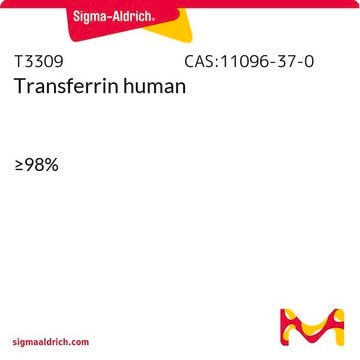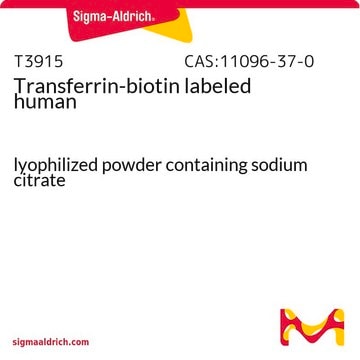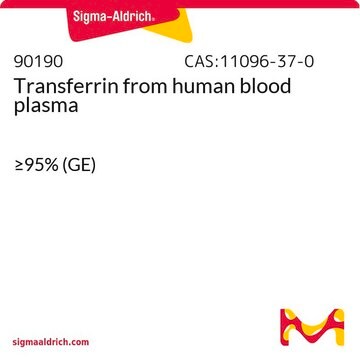Recommended Products
biological source
mouse
Quality Level
Assay
≥98%
form
powder
technique(s)
protein quantification: suitable
solubility
H2O: 20 mg/mL
UniProt accession no.
storage temp.
2-8°C
Gene Information
mouse ... Trf(22041)
General description
Transferrin is a 79 kDa protein and possesses two lobes, an N-terminal and a C-terminal lobe, interconnected by a short spacer. The domains interact to form metal ion-binding site.
Application
Apo-Transferrin from mouse has been used in serum protein quantification using surface plasmon resonance (SPR) microarray and serum protein cross-reactivity analysis. It has also been used in the analytical approaches for glycosylation studies like intact glycoprotein analysis, glycopeptide analysis and glycan analysis.
Biochem/physiol Actions
Apo-Transferrin from mouse is a serum protein involved in the transfer of iron to the cells. Apotransferrin can bind two Fe3+ ions. In the iron bound state, it is referred to as transferrin. It binds to transferrin receptors in the extracellular surface of cell membrane, internalizes and releases iron in the cytoplasm. Apotransferrin is cycled back to the serum for iron transport.
Storage Class Code
11 - Combustible Solids
WGK
WGK 3
Flash Point(F)
Not applicable
Flash Point(C)
Not applicable
Personal Protective Equipment
dust mask type N95 (US), Eyeshields, Gloves
Certificates of Analysis (COA)
Search for Certificates of Analysis (COA) by entering the products Lot/Batch Number. Lot and Batch Numbers can be found on a product’s label following the words ‘Lot’ or ‘Batch’.
Already Own This Product?
Find documentation for the products that you have recently purchased in the Document Library.
Customers Also Viewed
Evaluation of ion mobility for the separation of glycoconjugate isomers due to different types of sialic acid linkage, at the intact glycoprotein, glycopeptide and glycan level
Barroso A, et al.
Journal of proteomics, 173, 22-31 (2018)
Cells: Molecules and Mechanisms (2009)
Quantitative serum proteomics from surface plasmon resonance imaging
Lausted C, et al.
Molecular and Cellular Proteomics, 7(12), 2464-2474 (2008)
Transferrin: structure, function and potential therapeutic actions
Gomme PT, et al.
Drug Discovery Today, 10(4), 267-273 (2005)
Hasmik Grigoryan et al.
Analytical biochemistry, 394(1), 92-100 (2009-07-15)
Organophosphate (OP) esters bind covalently to the active site serine of enzymes in the serine hydrolase family. Recently, mass spectrometry identified covalent binding of OPs to tyrosine in a wide variety of proteins when purified proteins were incubated with OPs.
Our team of scientists has experience in all areas of research including Life Science, Material Science, Chemical Synthesis, Chromatography, Analytical and many others.
Contact Technical Service











